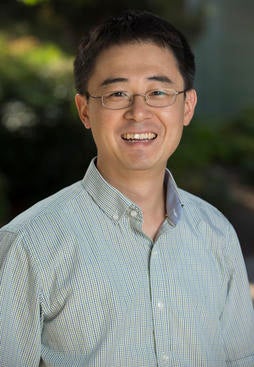Peng Wei, an assistant professor of physics and astronomy at UC Riverside, is a co-principal investigator and theme lead on a grant from the National Science Foundation, or NSF, supported by the NSF Convergence Accelerator — a new model of innovation for the government, industry, and academia.
The Massachusetts Institute of Technology, where Wei worked before coming to UCR in 2016, is leading the one-year research project.
Integrating multidisciplinary research, human-centered design, and team science, the NSF Convergence Accelerator program also leverages the insights of experts with wide-ranging industry experience. It aims to solve compelling societal or scientific problems and addresses challenges of national importance to produce deliverables of value to society. Designed to transition basic research and discovery into practice, this year’s program focuses on quantum technology and artificial intelligence.
“Our project, titled ‘Synergistic thrusts towards practical topological quantum computing,’ emphasizes the program’s quantum technology focus,” Wei said. “We are currently in Phase I of the NSF Convergence Accelerator program, which involves the development of a highly synergistic team focusing on human-centered design and initial prototyping for practical quantum computing. In just nine months, Phase I planning will become Phase II action.”
Specifically, the project will integrate Majorana zero modes, or MZMs, into superconducting qubit architectures to advance their application to quantum computing. A qubit is the basic unit of quantum computing. MZMs are novel particles that could be used to construct an exotic qubit, or a topological qubit, whose qubit quantum state is “fault-tolerant,” which means it is protected against sources of decoherence.
“Although the coherence time — or lifetime — for superconducting qubits has improved by more than five orders of magnitude in the past two decades, achieving a fault-tolerant or error-free qubit still requires significant improvement to become practical,” Wei said. “In this project, we intend to explore alternative approaches that promise to address issues of decoherence and quantum error using new materials known as topological superconductors.”
A topological superconductor, or TSC, is the material that hosts MZMs. Wei, who graduated from UCR in 2011 will study new TSC materials and deliver MZM-pair-hosting prototype nano devices for quantum information processing.
“Our project is built solidly on our recent observation of a pair of MZMs, which is the basic element of a topological qubit,” Wei said. “One of our goals is to building topological qubits using pairs of MZMs and scale them up into qubit architectures, that is, use new TSC materials and MZMs for superconducting quantum computing.”
Wei noted the project is high risk, but it also has the potential for a high payoff. The challenges are twofold. The first is the development of more robust TSC materials that allow the operation of a topological qubit at a much higher temperature compared to conventional superconducting qubits. The second is to convert such materials into scalable nano devices and operate the qubit quantum state using novel means.
“Manipulating the quantum information embedded in pairs of MZMs is challenging,” Peng said. “But the uniqueness of our material and our properly designed approach provide us with solid ground to stand on when taking on this challenge.”
Other researchers working with Wei on the project are grant principal investigator Jagadeesh Moodera, Patrick Lee, Liang Fu, and William Oliver of MIT.
About a third of the $785,000 grant funding will come to UCR.
